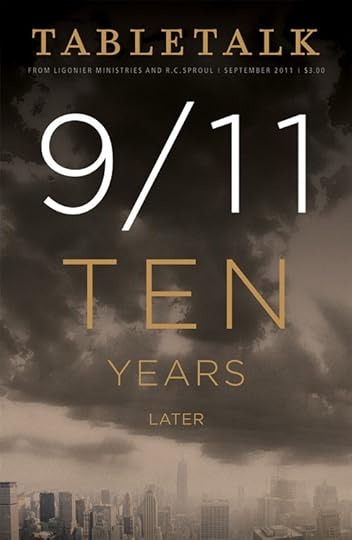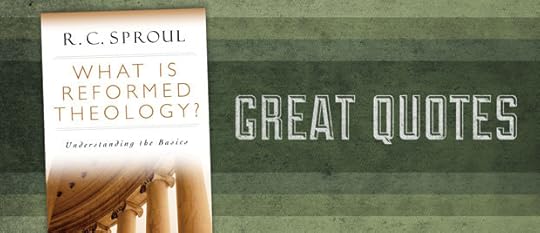R.C. Sproul's Blog, page 571
September 5, 2011
Saving Leonardo

Nancy Pearcey’s second book about culture in 5 years, Saving Leonardo is subtitled A Call to Resist the Secular Assault on Mind, Morals, & Meaning. Refined through lectures at Philadelphia Biblical University, Saving Leonardo complements her earlier book, Total Truth (2005). According to jacket notes, Saving Leonardo addresses the student of culture, with the goal of exposing secularism’s destructive and dehumanizing forces. Readers are left with one caveat: what you see and hear in the arts and popular media is not the innocent expression of personal opinion, but often deliberate antagonism toward a Judeo-Christian world and life view.
Because the author developed the manuscript as a teacher of young adults, Saving Leonardo is tonally a gradual expose, not a textbook or non-fiction novel. In it Pearcey names our culture’s naïve attraction to music, movies, and electronic games. Although aimed at young adults, Saving Leonardo excels as a readable, convincing defense of Christian orthodoxy for a wide popular audience.
This is actually a serious challenge to our present culture’s basic flippancy when it comes to the things of God. Regarding its usefulness beyond educating the young, its readers might be Christian artists, musicians, or writers who struggle with vocational calling. Any true artist, whether Christian or not, might take to heart its basic message. But there are enough philosophical questions to engage students of theology or future pastors. Indeed, that might prove to be its greatest value.
How does Saving Leonardo make the case for Christianity in a largely post-Christian world? It does so via hundreds of graphic images, with a fresh, dialogue-based approach to argument. But its great strength is Pearcey’s own life story. Her struggle as an agnostic child who entered college as a defiant enemy of traditional Christian teaching, but eventually became a disciple of Jesus, is a compelling one.
With all its content solidly backed by careful research, the book seldom mentions a composer, writer, or painter without quoting sources. When Pearcey talks about music, it is as a former violinist who has studied the great composers. When she assesses painting and architecture, she has done her homework. And, when discussing philosophy, Saving Leonardo shows a command of all the major schools and trends.
For example, the chapter entitled “Art Red in Tooth and Claw (The Enlightenment Heritage) goes quickly through a list of literary icons like Jack London and others. These icons come from an essentially naturalistic view of the world. Pearcey then develops each leading writer’s relationship to the enlightenment’s dismissal of divine creation, making her case respectfully, acknowledging genius and talent while challenging their world view.
Unlike some studies of culture through the eyes of Christian faith, Pearcey’s maintains respect for the humanity of painters, musicians, and writers. She is not witch-hunting in the arts, looking for atheists behind every canvas. Instead, she seems determined to help readers visualize the forces that foster hopelessness, emptiness, and determinism in all of culture. Echoing Francis Schaeffer’s pre-gospel apologetic directed at the modern mind, Pearcey bears no prejudice or guile toward her enemies. Compassionate and tough, she spots or challenges a philosophical position, then addresses the person who is tragically blind to the grace of God.
She is likewise tough in“Morality at the Movies” (chapter 9). From pro-abortion films like Cider House Rules to materialist/amoral messages in Woody Allen’s Crimes and Misdemeanors, the book reveals agenda-driven films for what they are. Even pantheistic animated films like Pocahontas are exposed for their utter disregard of divine creation, and whose demure characters charm viewers into affection for ‘human’ rocks, trees, and flowers. This chapter alone should be required reading for Christian parents and young adults who are heavily influenced by cinema.
Finally, the Epilogue, “Bach School of Apologetics,” becomes a postscript to the book’s message. In it Pearcey reports that Bach’s music has taken Japan captive to its overt Christian themes, by way of Baroque forms and word painting. In fact, through listening to Bach, some Japanese have been converted. Even the unconverted recognize that the Leipzig kappelmeister was a Christian whose genius was beyond comprehension to his contemporaries, and who even mystifies musical experts of the present day.
Author Nancy Pearcey summarizes her work with the conviction that the church needs to nurture, not tame or exploit, its artists, writers, and musicians. I cannot think of a better challenge for Christian readers of Saving Leonardo. Indeed, the author admonishes ‘world and life view’ adherents who use the term merely to impress friends. Since the Christian gospel is the ultimate object of every intellectual pursuit in Christendom, those committed ones who name Christ as Lord must not give in to pride or “empty intellectualism.”
I highly recommend we all digest Saving Leonardo. Clearly it is a resource for anyone teaching or influencing young minds. In a previous era, we would have no need to explain to our children the bizarre exploits of Lady Ga Ga, or expose sugar-coated idolatry in Avatar. But for those encounters when we are nakedly countercultural, Pearcey’s latest book prepares us for at least a modicum of informed compassion.
Terry Yount is a musician, freelance composer and writer living in Orlando, Florida. He has provided organ and instrumental music for Ligonier’s National Conference as director of Ligonier Sinfonia, which he founded. He also serves as Saint Andrew’s Organist and Dean of Saint Andrew’s Conservatory of Music.

September 4, 2011
Twitter Highlights (9/4/11)
Here are some highlights from the various Ligonier Twitter feeds over the past week.

Reformation Trust We need to do more than sing "Amazing Grace"—we need to be repeatedly amazed by grace. -R.C. Sproul http://bit.ly/qFURja

Ligonier One of the greatest follies is the folly of procrastination. We keep saying...tomorrow we will make ourselves right with God. -R.C. Sproul

Tabletalk Magazine "Most Christians salute the sovereignty of God but believe in the sovereignty of man." - R.C. Sproul

Reformation Trust Universal atonement exalts the will of man & debases the glory of God. -Joel Beeke http://bit.ly/eeqP7C

Ligonier Beloved, we need to be careful about the words of the music that we sing, that those words communicate truth. -R.C. Sproul

Tabletalk Magazine "What people revere, they resemble, either for ruin or restoration." - G.K. Beale

Ligonier Christians can have radical and serious falls but never total and final falls from grace. - R.C. Sproul
You can also find our various ministries on Facebook:
Ligonier Ministries | Ligonier Academy | Reformation Bible College
Reformation Trust | Tabletalk Magazine

September 3, 2011
The Faces of Ministry at Ligonier: Randi Walter
Randi joined the Ligonier team as Director of Stewardship in early 2008, having served other ministries and organizations in their fundraising efforts for more than a dozen years. In this capacity, Randi enjoys getting to know our constituents and helping them achieve their personal, spiritual, and financial goals by investing in our mission.
 In particular, Randi works with supporters interested in making contributions to our work through significant gifts, donations of stock or other appreciated assets, and through their estate plans. She has overseen HERE WE STAND: THE CAMPAIGN FOR LIGONIER MINISTRIES since its launch in the fall of 2008. Since that time, $7.8 million in commitments have been received to establish Ligonier Academy and its Reformation Bible College situated on a new campus home that now serves as the base for all ministry operations.
In particular, Randi works with supporters interested in making contributions to our work through significant gifts, donations of stock or other appreciated assets, and through their estate plans. She has overseen HERE WE STAND: THE CAMPAIGN FOR LIGONIER MINISTRIES since its launch in the fall of 2008. Since that time, $7.8 million in commitments have been received to establish Ligonier Academy and its Reformation Bible College situated on a new campus home that now serves as the base for all ministry operations.
Raised in New York City in a Jewish home, Randi never could have imagined herself on staff at a Christian ministry. Since her conversion, she has been an ardent student of the Scriptures who teaches and writes women’s Bible studies. Randi says, “I have benefitted tremendously from the teaching of R.C. Sproul in my personal discipleship and in preparing to teach others. The biblical and theological truths I have learned through Ligonier have shaped my Reformed view of Scripture and theology.”
Randi graduated from Penn State with a psychology degree. With a love of horses and a desire to help others, Randi volunteers as an equine therapist for the disabled. She counts it a privilege to advance the Kingdom daily in her work and to get to know brethren from Christ’s church worldwide. She works from her home office in Fort Lauderdale, Florida, where she lives with her husband, David, a hospital pharmacist. They have been married for almost 30 years and have two grown children and two cats.

September 2, 2011
A Primer on Legalism
Adapted from The Reformation Study Bible.
The New Testament views Christian obedience as the practice of "good works." Christians are to be "rich in good works" (1 Tim. 6:18; cf. Matt. 5:16; Eph. 2:10; 2 Tim. 3:17; Titus 2:7, 14; 3:8, 14). A good deed is one done according to the right standard, God's revealed will; from a right motive, love for God and others; and with a right purpose, the glory of God.
Legalism is a distortion of obedience that can never produce good works in this sense. It skews motive and purpose, seeing good deeds as ways to earn God's favor. It can be arrogant and contemptuous of those who do not labor in the same way. Finally, legalism's self-advancing purpose squeezes humble kindness and compassion out of the heart.
Legalism is a distortion of obedience that can never produce good works...
Two Kinds of Legalism in the New Testament
In the New Testament we meet different kinds of legalism. Legalists among the Pharisees thought that because they were descended from Abraham they were guaranteed approval by God, while paradoxically they formalized daily observance of the law, down to minutest details, as the rule of life. In doing so they avoided what the law truly required. Judaizers were legalists who taught Christian believers that they must go on to become Jews by being circumcised and observing the religious calendar and ritual laws, and in this way gain favor with God. Jesus attacked the legalism of the Pharisees; Paul, the Judaizers.
The Pharisees
The Pharisees that opposed Jesus thought of themselves as faithful keepers of the Mosaic law. Yet in emphasizing minor details they neglected what matters most (Matt. 23:23, 24). Their elaborate and misguided interpretations of the law denied its true spirit and aim (Matt. 15:3-9; 23:16-24). They substituted human tradition for God's authoritative law, binding consciences where God had left them free (Mark 2:16-3:6; 7:1-8). At heart they were hypocritical, seeking human approval for themselves and condemning others (Luke 20:45-47; Matt. 6:1-8; 23:2-7).
The Judaizers
The Judaizers opposed by Paul added to the gospel requirements for salvation that obscured and denied the all-sufficiency of Christ (Gal. 3:1-3; 4:21; 5:2-6). The idea that there must be additional requirements to perfect the gospel was the root of their error. Paul opposed this idea no matter who advanced it (Col. 2:8-23), because it corrupted the way of salvation. Like Jesus, he would not tolerate those who brought new burdens to lay on the sheep.
Legalism erroneously teaches that there must be additional requirements to perfect the gospel.
Adapted from The Reformation Study Bible's theological article on "Legalism"

$5 Friday: Names of God & Doctrines of Grace
Today's $5 Friday resources look at the doctrines of grace, the church, worldviews, and the names of God. Sale runs from 8 a.m. Friday through 8 a.m. Saturday EST.

September 1, 2011
Columns from Tabletalk Magazine, September 2011
The September edition of Tabletalk is out. This issue examines the decade proceeding the events of September 11, 2001. It pays special attention to American's response to and demands of God, and it instructs Christians on how to interpret and react to the various issues surrounding and springing from that dark day. Contributors include R.C. Sproul, John Piper, Marva Dawn, C.J. Mahaney, Paul David Tripp, and R.C. Sproul Jr.
 We do not post all of the feature articles or the daily devotionals from the issue, so you'll have to subscribe to get those. But for now, here are links to a few select columns and articles from this month:
We do not post all of the feature articles or the daily devotionals from the issue, so you'll have to subscribe to get those. But for now, here are links to a few select columns and articles from this month:
"Ten Years Later" by Burk Parsons
"Ten Years Later" by R.C. Sproul
"Where Is Your Hope?" by Marva Dawn
"Happy Pastors" by C.J. Mahaney
"Living in Light of the Gospel: An Interview with Paul David Tripp"
"Sheep, Wolves, Snakes, and Doves" by John Piper
"The Days of the Dead" by R.C. Sproul Jr.
*****
If you have not subscribed yet, you should. It's only $23 for a year, and $20 to renew. You save even more if you get a 2- or 3-year subscription (as little as $1.36 per issue). Special discounts for churches or businesses are available for those who want multiple copies of each issue. Start receiving Tabletalk by calling one of Ligonier Ministries' resource consultants at 800-435-4343 (8am-8pm ET, Mon-Fri) or subscribe online.

August 31, 2011
Great Quotes from What Is Reformed Theology?

I recently had the opportunity to read through almost all of the books of R.C. Sproul. Along the way I built a collection of some of the best quotes from each one of them. Here are several of the best from What Is Reformed Theology?.
In Reformed theology, if God is not sovereign over the entire created order, then he is not sovereign at all. The term sovereignty too easily becomes a chimera. If God is not sovereign, then he is not God.
Scripture teaches that we are created in the image and likeness of God. This does not mean that we are little gods. The image does not obscure the difference between God and man. It does assure, however, some point of likeness that makes communication possible, however limited it may be.
I love the church. It is the body of Christ. It nurtures my soul and aids in my sanctification. But the church cannot redeem me. Christ and Christ alone can save me. The sacraments are precious to me. They edify and strengthen me, but they cannot justify me.
It is a profound political reality that Christ now occupies the supreme seat of cosmic authority. The kings of this world and all secular governments may ignore this reality, but they cannot undo it. The universe is no democracy. It is a monarchy. God himself has appointed his beloved Son as the preeminent King. Jesus does not rule by referendum, but by divine right. In the future every knee will bow before him, either willingly or unwillingly. Those who refuse to do so will have their knees broken with a rod of iron.
Reformed theology does not teach that God brings the elect “kicking and screaming, against their wills,” into his kingdom. It teaches that God so works in the hearts of the elect as to make them willing and pleased to come to Christ. They come to Christ because they want to. They want to because God has created in their hearts a desire for Christ.
It still seems that if God gives grace to one person, in the interest of fairness he “ought” to give grace equally to another. It is precisely this “oughtness” that is foreign to the biblical concept of grace. Among the mass of fallen humanity, all guilty of sin before God and exposed to his justice, no one has any claim or entitlement to God’s mercy. If God chooses to grant mercy to some of that group, this does not require that he give it to all.

August 30, 2011
Justification: The Heart of the Gospel
For the Apostle Paul, the doctrine of justification was the heart of the gospel (Rom. 1 :17; 3:21-5:21; Gal. 2:15-5:1). Martin Luther declared that justification was the doctrine by which "the church either stands or falls." R.C. Sproul's mentor John Gerstner goes further in reminding us that it's not only the church that stands or falls by this doctrine, "but the individual also."
As justification is so important, it's necessary that we have a clear understanding of what this doctrine teaches. While reading Galatians in the The Reformation Study Bible recently, I appreciated the clear and succinct explanation offered in its theological article on justification.
Justification is God's act of pardoning sinners and accepting them as righteous for Christ's sake. In it, God puts permanently right their previously estranged relationship with Himself. This justifying sentence is God's bestowal of a status of acceptance for Jesus' sake (2 Cor. 5:21).
Justification is God's act of pardoning sinners and accepting them as righteous...
God's justifying judgment seems strange, for pronouncing sinners righteous may appear to be precisely the kind of unjust action by a judge that God's own law forbids (Deut. 25:1; Prov. 17:15). Yet it is a just judgment, for its basis is the righteousness of Jesus Christ. As "the last Adam" (1 Cor. 15:45), our representative head acting on our behalf, Christ obeyed the law that bound us and endured the punishment for lawlessness that we deserved, and so "merited" our justification. Our justification is on a just basis (Rom. 3:25, 26; 1 John 1:9), with Christ's righteousness reckoned to our account (Rom. 5:18, 19).
God's justifying decision is in effect the judgment of the Last Day regarding where we will spend eternity, brought forward into the present and pronounced here and now. It is a judgment on our eternal destiny; God will never go back on it, however much Satan may appeal against the verdict (Zech. 3:1; Rom. 8:33, 34; Rev. 12:10). To be justified is to be eternally secure (Rom. 5:1-5; 8:30).
To be justified is to be eternally secure...
The necessary means of justification is personal faith in Jesus Christ as crucified Savior and risen Lord (Rom. 4:23-25; 10:8-13). Faith is necessary because the meritorious ground of our justification is entirely in Christ. As we give ourselves in faith to Jesus, Jesus gives us His gift of righteousness, so that in the very act of "closing with Christ," as older Reformed teachers put It, we receive the divine pardon and acceptance we can find nowhere else (Gal. 2:15, 16; 3:24).
Find other helpful answers in the thousands of in-depth study notes and 96 theological articles included in The Reformation Study Bible.

August 29, 2011
Get Dr. Sproul's Series on Reformed Theology for a Donation of Any Amount
Few evangelical Christians today understand Reformed theology. They know it has something to do with predestination, and they may have heard of “the five points.” But they can’t name these points, and they think no one believes most of them anymore. Dr. Sproul says there’s more to Reformed theology than these five points. Reformed theology reveals just how awesome the grace of God is. In this series, Dr. Sproul offers an introduction to Reformed theology, the heart of historical evangelicalism.
 This week you can get this CD series for a donation of any amount. Messages include:
This week you can get this CD series for a donation of any amount. Messages include:
Catholic, Evangelical, and Reformed
Scripture Alone
Faith Alone (Parts 1 & 2)
Covenant
Total Depravity (Parts 1 & 2)
Unconditional Election
Limited Atonement
Irresistible Grace
Perseverance of the Saints
Offer valid through September 2nd.
Donate Now
.

It Was Nice While It Lasted

It is a sure sign that sin messes things up that we keep watching the same boxing match over and over again, between truth and unity. Both sides, of course, insist that they have a deep and abiding love for the other. They shake hands in the center of the ring, go back to their corners, wait for the bell and come out ready to destroy the one they love. In the stands we stand, screaming ourselves hoarse in defense of our favorite.
Until recently unity has been on a hot streak. Charismatics, dispensationalists, YRR, and old school Reformed folk, post-mills and a-mils have managed to work together for the gospel. Blogs and conferences, magazines and books have born much fruit from cross-pollinating. We discovered that our brothers on the other side of this aisle do not actually have horns. We remembered that the beauty of what unites us is not only more important, but more potent than the nuances that divide us.
But we should never count out truth, or at least our own version of it. Though it was on the ropes, like Rocky in the last few rounds, truth has shown a rare ability to take a punch, and come back strong. It has moved well past highlighting what separates charismatics from dispensationalists and this Reformed group from that, and has now has each camp engaged in its own civil war. Cessationism versus continuationism, neckties versus t-shirts, beer versus teetotalism have sparked fires that rage inside our own worlds.
So what do we do? Can we get truth and unity to kiss and make up? Only if we Christians learn to grow up. We need to not only learn to distinguish between primary and secondary doctrines/practices, we need to learn to value them accurately. Can we both agree that being wrong on baptism is not a damnable heresy, and also affirm that it is an issue that matters? Can I seek to correct my Baptist brothers in a way that speaks to them as brothers who are wrong on an important issue? And can I in turn hear with grace my Baptist brothers as they lovingly seek to correct my error on the issue? Can I be concerned that my charismatic brother is leaving open the door for false prophecy and at the same time understand that he is concerned that I am boxing in the Holy Spirit?
Can we both agree that being wrong on baptism is not a damnable heresy, and also affirm that it is an issue that matters?
I have an opinion on virtually every issue that is being argued on the internet. I think some positions being espoused are good, sound, biblical. I think others are fallacious, dangerous, and unbiblical. I know that whatever the Bible teaches, that is what’s right and true. And I know the Bible teaches that I am often wrong. It is not Rodney King that asks if we can all get along. It is Jesus asking, in His high priestly prayer (John 17). He is the Truth, and He calls us to unity. That comes in reflecting His character. He, even when He corrects us, is for us. He, even when we are wrong, loves us perfectly. He is lowly in spirit and will not break a bruised reed.
We will not change until we choose our heroes not by how cogently or fiercely they defend our position on this issue or that, but by how much they reflect the grace of Christ whatever their position.

R.C. Sproul's Blog
- R.C. Sproul's profile
- 1969 followers




